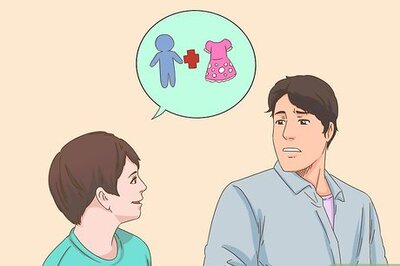
views
Sex may permeate our popular culture, but conversations about it are still associated with stigma and shame in Indian households. As a result, most individuals dealing with sexual health issues or trying to find information about sex often resort to unverified online sources or follow the unscientific advice of their friends.
To address the widespread misinformation about sex, News18.com is running this weekly sex column, titled ‘Let’s Talk Sex’. We hope to initiate conversations about sex through this column and address sexual health issues with scientific insight and nuance. The column is written by sexologist Prof (Dr) Saransh Jain.
In this article, Dr Jain will unpack the mystery of PCOS and explore the various causes, symptoms, and treatment options available to those living with the condition.
Polycystic ovary syndrome (PCOS) is one of the most common hormonal disorders in women, affecting up to one in five. The word “polycystic” means “many cysts.” With PCOS, many small sacs of fluid develop along the outer edge of the ovary. These are called cysts. The small fluid-filled cysts contain immature eggs. These are called follicles which fail to regularly release eggs that result in irregular periods and fertility issues.
But the causes of PCOS are still being studied and aren’t entirely clear yet. What we do know is that PCOS seems to be related to an imbalance in a woman’s sex hormones, including testosterone and estrogen. This imbalance of hormones can cause a variety of problems, including the development of small cysts on the ovaries.
There are a few different treatment options for PCOS depending on your symptoms and what you’re looking for. Some women find relief from simply changing their diet or exercise routine, while others may require medications or surgery. Consult your doctor to figure out what’s best for you.
Causes of PCOS
There is no one single cause of PCOS, but rather a combination of genetic and environmental factors that contribute to its development. While the exact cause of PCOS is unknown, there are a few things that experts believe may contribute to the condition.
· Hormones: An imbalance of reproductive hormones may contribute to the development of PCOS.
· Genetics: PCOS may be hereditary, so if your mom or sister has it, you may be more likely to develop the condition.
· Insulin resistance: This is when your body doesn’t respond properly to insulin, and it’s thought to play a role in the development of PCOS.
· Inflammation: Some studies have found that women with PCOS have higher levels of inflammation.
· Androgens: One theory suggests that PCOS is caused by an overproduction of androgens (male hormones) in the body. This overproduction can be due to a number of factors, including genetics, obesity, and insulin resistance.
Symptoms of PCOS
There are a variety of symptoms that can be associated with PCOS, and they can range from mild to severe. The most common symptoms include:
· Irregular periods: This is one of the most common symptoms of PCOS, and it occurs when the ovaries don’t release an egg (ovulation) on a regular basis. As a result, the hormone levels in the body become out of balance, which can lead to heavier and/or more irregular periods.
· Heavy bleeding: The uterine lining builds up for a longer period of time, so the periods you do get can be heavier than normal.
· Infertility: PCOS can make it harder to get pregnant, but it’s not impossible. If you’re trying to conceive, it’s important to talk to your doctor about your options.
· Weight gain: Many women with PCOS find it difficult to lose weight, or they may actually gain weight. This is often due to insulin resistance, which is a condition where the body doesn’t use insulin properly. Insulin resistance can also lead to type 2 diabetes.
· Excess hair growth: This symptom is often referred to as “hirsutism,” and it refers to excessive hair growth on the face, chest, back or other areas where men typically grow hair. Hirsutism is caused by an imbalance of hormones in the body, and it affects up to 70% of women with PCOS.
· Acne: Acne is another common symptom of PCOS, and it occurs when there is an overproduction of testosterone in the body. This excess testosterone leads to an increase in sebum production, which can clog pores and lead to breakouts.
· Darkening of the skin: Dark patches of skin can form in body creases like those on the neck, in the groin, and under the breasts.
· Headaches: Hormone changes can trigger headaches in some women.
These are just some of the most common symptoms, but there are others as well. If you think you might have PCOS, it’s important to talk to your doctor so they can help you figure out what’s going on.
What Are the Treatment Options for PCOS?
There are many treatment options for PCOS, but the most effective approach depends on the individual woman’s symptoms and health goals. For example, if a woman with PCOS is trying to get pregnant, she may be treated with fertility drugs or other treatments to promote ovulation. If a woman with PCOS is not trying to get pregnant, she may be treated with birth control pills or other hormonal contraceptives to help regulate her menstrual cycle and reduce her risk of endometrial cancer. Other treatment options for PCOS include lifestyle changes (such as losing weight, increasing physical activity, and reducing stress), insulin-sensitizing drugs (such as metformin), and medications to treat hirsutism (excessive hair growth).
Surgery can be an option to improve fertility if other treatments don’t work. Ovarian drilling is a procedure that makes tiny holes in the ovary with a laser or thin heated needle to restore normal ovulation.
Conclusion
PCOS is a gynaecological disorder with a wide range of potential symptoms. However, with the right diagnosis and treatment plan, women with PCOS can live full and healthy lives. See your doctor if your body has skipped periods, or you have other PCOS symptoms like hair growth on your face or body. Also see a doctor if you’ve been trying to get pregnant for 12 months or more without success and begin working on a treatment plan that’s right for you.
Prof (Dr) Saransh Jain is the winner of the Swasth Bharat Rattan Award and is a Certified and Licensed Sexologist by the American Board of Sexology. He is currently a Senior Consultant at Dr SK Jain’s Burlington Clinic in Lucknow. The views expressed in this article are those of the author and do not represent the stand of this publication.
Read all the Latest Lifestyle News here




















Comments
0 comment